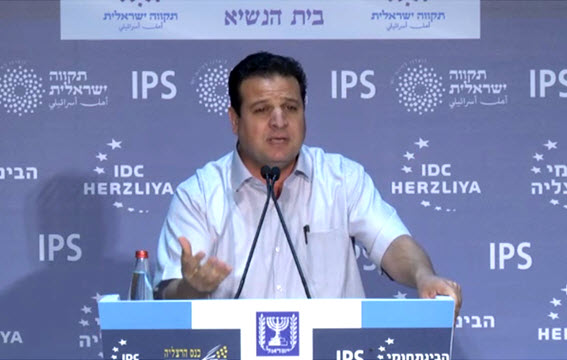Israel has undergone a cultural and demographic earthquake, President Reuven Rivlin told participants in the 16th annual Herzliya Conference on Tuesday, June 14, reiterating what he said a year ago when he called for a new Israeli agenda. Rivlin said that when he presented his partnership vision of a shared national identity last year, it caused a lot of controversy, and he was even accused of being a “post-Zionist.”
For all that, he recognized and accepted that not everyone who lives in Israel is or should be a Zionist. What he wanted for all Israelis was a “shared hope for equal opportunities and equal rights to education, to social services, to academia and to employment.”
Hadash MK Ayman Odeh, head of the Joint List drew the most applause in the conference when he argued for adopting a different attitude toward the Arab sector. Building citizenship through partnership would be beneficial to the whole country, he said, and stressed the significance of focusing on mutual interests rather than trying to overcome points of contention. MK Odeh, opened his address noting all the ideals and values that he shared with the president: “Bringing the various populations closer to one another and advancing general welfare of all citizens. Building shared citizenship.” But he added that there are “important things that we cannot ignore… The basic thing that guides me in politics is my deep internal conviction that the guiding interests of both people are equal. Everyone wants the blessing of life.”
He emphasized the principles of citizenship: “What does it mean to be a citizen? We want complete equality on the national level and the civil social level.” He said that it was impossible to only talk about the economy and citizenship without the recognized the rights of the Arab-Palestinian national minority in Israel. He also noted how he was always steered to discuss the future rather than the past: “We have a deep pain; in the heart of every Arab; the injustices of the past. And it hurts me so much when I hear narratives of 3,000, 4,000 years and I am told not to talk about the narratives of 60 years but to look into the future.”
Odeh focused specific attention on the subjects of unrecognized villages and said that it would not hurt anyone for the state to “state recognizes the terrible massacre of Kafir Qasim and the massive injustices and confiscation of land.” He stated that Hadash stance is two states for two people, side by side with complete equality for both but “crimes occurred and we have to talk about that… There are citizens of the State of Israel who are not allowed to return to their land… Will it harm one Jewish person… If people of Mahalul are returned to Mahalul… To build 80 villages… Will it harm one Jewish person? We need to talk about civil and national rights for Arabs in Israel and it doesn’t have to harm anyone.”
He cited as an example the fact that Arabic is one of Israel’s official languages. But if it wasn’t he said, and he came to the Knesset with the proposal that Arabic should be accepted as an official language, 60 MKs would turn on him and say: “This is a Jewish state. Why do we need Arabic as an official language?” Odeh suggested that it would be easier to start a dialogue about economics and social issues because they affect everyone.
“When the quality of life of the Arab sector is improved, it will affect not only Arabs but the whole national economy,” he said. While agreeing with Rivlin on some points, Odeh said that there had been a serious omission in that no mention had made of the Palestinian Arabs living in the occupied West Bank and Gaza Strip under siege.



